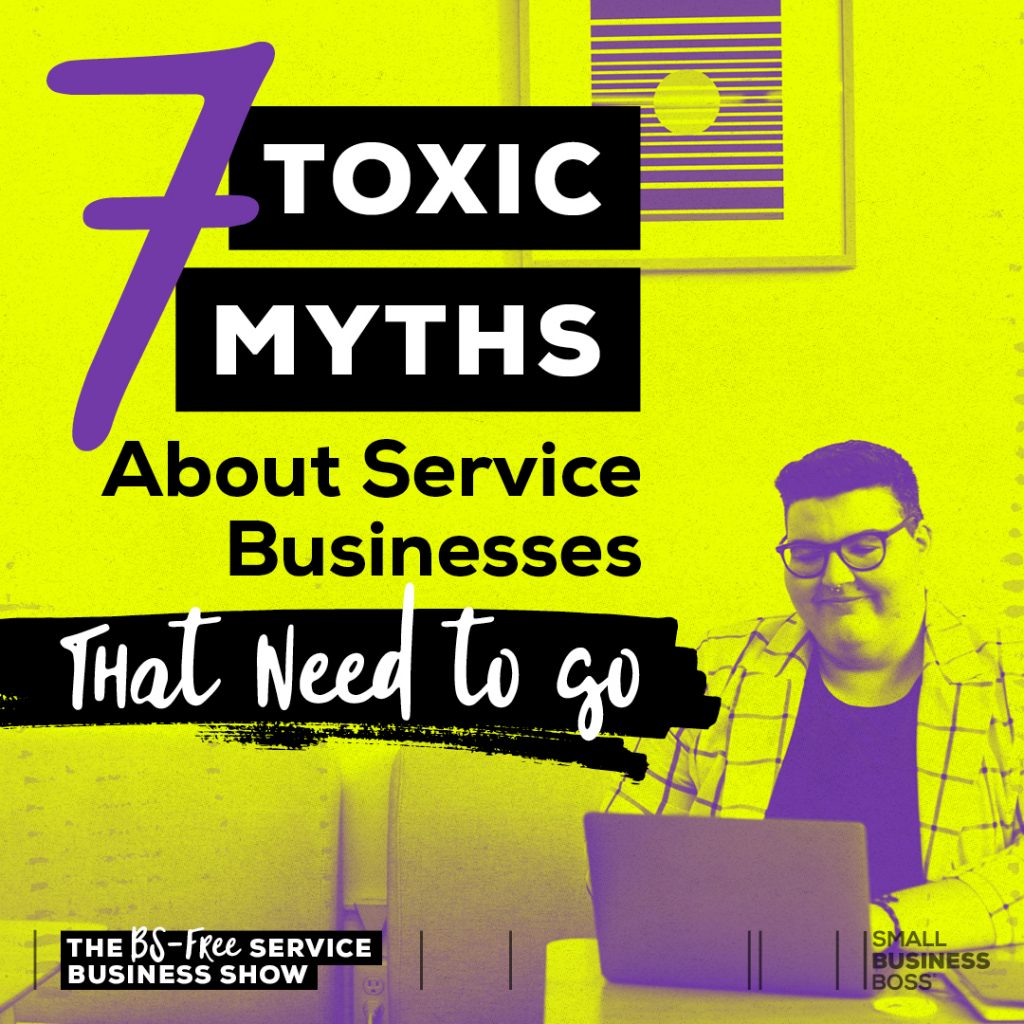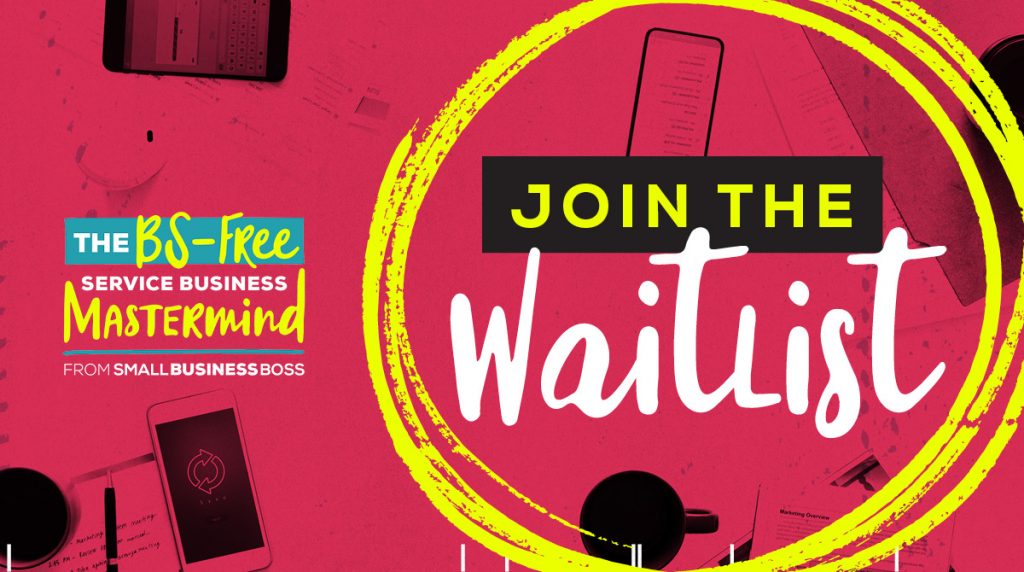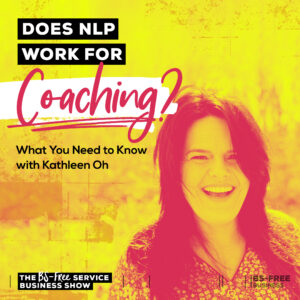
Search the site:
7 Toxic Myths About Service Businesses That Need to Go
I’ve spent my entire 20+ year career in service businesses, so when people roll up on the internet and tell me all the things wrong with them, my back immediately goes up.
In online business circles, service businesses are treated as the bottom of the barrel. There’s a weird unofficial hierarchy that’s been created which marginalizes done-for-you service providers as a way to get them to learn how to be a coach, or how to create a course. So many of these myths and stories are designed simply to sell you something, and in the process, they challenge what we think we know about our service businesses.
The fact is, services will always be in style, especially those that are done-for-you as people are buying back their time, and want your expertise and skills. That will never go away, no matter what any celebrity entrepreneur wants to tell you in order to get you to buy their course, program or coaching methodology.
Services are here to stay, especially as in the real world, service businesses still make up the majority of businesses.
I know, I’m preaching to the choir, but in this episode, I wanted to unpack the seven most toxic myths that go with running a service business, as I see these things seeping into the hearts and minds of my clients. They need to be examined, and thrown away as they’re doing damage to how we think about our businesses, our potential, our clients and more.
With each one, we’re going to look at the myth, and then dig into the truth, so we can reset and throw them away for good.
#1: Your Income is Capped With a Service Business
Let’s start with the biggest myth about service businesses, which is that your income is capped when you offer services. I’ve talked about this before, and I will talk about it again I’m sure, but this myth is hands down one of the most toxic, as it’s patently untrue.
This myth does so much damage to service business owners as it’s repeated day in day out by people trying to sell us the “easy button” dream of business ownership. And it’s responsible for so many service business owners abandoning a profitable business with real growth potential in favor of the shiny object of a course or program, when that’s not really what they want to do.
A common example of this I see is when people hit anywhere from $50k to $100k a year in revenue. Their business is really working for them, and now they’re feeling a bit maxed out. Instead of addressing the structural or system challenges in their business that would allow them to free up their time, they end up swapping out services for something else entirely. The only problem is that they’re likely to replicate the same challenges, and end up at the same place.
Plus, it’s important that we consider how we want to spend our time and what truly works best for us. Chasing the promise of passive income is often a money-driven decision with no consideration given to what we actually want. Personally, I need to work with people. I love services for that reason, as I like being able to get behind-the-scenes in many different businesses. That’s why services work for me, and maybe you’re the same, so don’t believe the “you can’t grow your services business” hype!
Repeat after me. My income isn’t capped with a service business. There are always options for how you can grow your income, but it comes down to you deciding if you want to go that route. Do you want to raise your prices? Offer a premium service? Grow a team? Build an agency? Every one of those are options and are viable ways to grow the bottomline.
#2. The Real Money with Services is in Coaching
This next myth is something I’ve noticed as a growing trend where done-for-you service providers are coached to start coaching. Yes, that’s totally meta, but I see it all the time, as service providers are encouraged to take on coaching as it’s something you can apparently charge “more” for.This one is interesting as it’s at the intersection of service business owners feeling stuck, like their income is capped, or that they’re plain burned out. So they work with a coach to help them work through those things, and the coach’s solution is to stop offering done-for-you services.
Why? A big reason for this is that many coaches out there simply don’t know how done-for-you services work. They’re unable to address the underlying problems or see the potential fixes that would allow someone to thrive offering services. As a coach, coaching is what they know, and they see how their client could charge for it.
This, my friends, is a hot mess. And it’s a huge problem on multiple levels. First off, the real money in services isn’t necessarily with coaching. That’s a gross oversimplification, and the coaching segment of the online business market charges exorbitant, luxury prices. There’s the assumption made that everyone can, and should do this.
Which brings me to this. If everyone is a coach, who’s actually doing the damn work? Someone needs to offer services, and in my experience selling a tangible done-for-you service is a hell of a lot easier than a squishy “transformation” from coaching.
Plus, there’s the bigger problem in all of this that we don’t talk about. Not everyone should be a coach. Coaching work takes a special set of skills and expertise. Just because anyone can call themselves a coach doesn’t mean they should be working with people in this capacity. I’ve seen so much damage done by people who had no business being a coach over the years.
Which brings me to my next toxic myth, as coaching takes exquisite boundaries, and one of the big myths about running a service business is related to boundaries.
#3. Boundary Problems Are Inevitable When You Work with Clients
Boundaries are always a hot topic, because we’re human and boundaries are always going to be work in progress. In the context of a service business, there’s this myth that boundary problems are inevitable when you work with clients.
Here’s the thing. Unless we’re all going to turn ourselves into robots, boundary problems are going to happen because we’re human. With a service business, because there’s a relationship with your client involved and ongoing interaction, boundaries are part of the deal.
Having a different type of business doesn’t eliminate the need for boundaries. They’re just different, so it’s time for us to let this myth go entirely.
The problem isn’t working with clients when it comes to boundaries. There’s no default setting that requires us to let our boundaries be trampled upon by clients. In fact, nothing could be further from the truth.
When we work with clients, we’re building a relationship, and it’s up to us to define what that relationship looks like. We need to set our boundaries from the onset, and then manage it from there.
Usually when I’m having boundary problems, they’re the result of something I’m doing or have done. It’s easy to blame “clients” as a group and decide that if you just don’t work with clients anymore, your problems will magically go away. But guess what? When you don’t work with clients, you’re working with customers or your team or someone else instead and boundaries will always need to be in place.
In short, there’s no getting around the need for boundaries, it’s part of being human.
The good news is that if we’re the one responsible for our boundary challenges it means we can reset or revamp them at any time. And if you’re struggling with boundaries, today’s as good a day as any to get better ones in place.
#4. All Service Businesses Are the Same
Have you ever been on a sales page and noticed when they say who the program or coaching is for they list out a million different types of service providers?
I sure have. And it’s a great example of a myth I see at work all that time, and it’s that services businesses are all the same, and that they all need the same things.
Nothing could be further from the truth. There are so many different types of service businesses, and depending on who your client is, everything shifts. What a wedding photographer needs to do as a B2C business, versus what I do in my agency as a B2B business, versus someone selling to other entrepreneurs in a B2E business is dramatically different.
This idea that service businesses are a monolith is so toxic as it leads to so much frustration and wasted time by service providers.
We need to leave one-size-fits-all service business advice behind. Anyone trying to tell you that they can help all these different types of businesses is full of it, and providing cookie cutter, oversimplified strategies and tactics.
Instead, we need to look for specificity as how we market, sell and serve different groups of clients should be unique to that market. Sure, some strategies will cross over, but we need greater discernment about what and will not work for our target client.
Especially as even if one thing works for a coach in the B2E market, it may not work for a done-for-you service provider. This is where we need to be very wary of any hot new tactics that emerge, as they may see like everyone is doing them, but they may be all wrong for you, your clients, and your business.
By getting specific, we can make things so much simpler too. We can stop chasing the latest and greatest online marketing tactic, and focus on what we know works. We can stop wasting time on shiny objects and spend our time on other, more impactful things.
#5. Sales Tactics That Are All Kinds of Wrong
I’m about to get my rant on, but this builds off the last myth of service businesses all being the same. This shows up big time when it comes to sales strategies and tactics for service businesses, and it does an incredible amount of harm. It’s toxic and it needs to be disposed of for you.
In online business circles there’s an overarching focus on sales strategies and tactics that are designed to sell to other entrepreneurs. The way people are being taught to sell is lacking in nuance, and does an incredible disservice to so many service business owners.
First, it does us a disservice by teaching us to sell based on fear. The majority of the tactics that are common in the online business world are driven by getting people to take action and to do so quickly. From tactics designed to use artificial scarcity to those around normalizing spending money you don’t have, fear is the name of the game.
When you sell to your clients using fear you’re starting off the relationship from a place of mistrust, high expectations and potentially buyer’s remorse. While these tactics may be okay for a $27 ebook that leads into a course upsell, they’re not things that build a lasting, trust-based relationship for you as a service provider.
Sure, you may make the sale, but you’re compromising the trust of your clients by starting your relationships off this way.
Instead, we need to look at how we can build and maintain trust every step of the way as we market, sell and serve our clients.
The other issue with how these sales tactics are used is that many times they’re completely wrong for our audience. The majority of these approaches are best used for B2E businesses, and ultimately for newer business owners. Someone with an established business like mine doesn’t have the time or the inclination to sit through a webinar, dig around for your price, talk to your sales coach and so on. If we’re going to work with you, we want to speak to you, and cut the crap in the middle.
I see so many business owners using these complex approaches to sales in an effort to automate the process, but they’re failing to account for the fact that people want to work with people. And while it may work for a course, if someone is buying coaching or a done-for-you service, you’re making it needlessly complex.
To break-free from this, we need to lean into figuring out what’s in service of our potential clients, remove complication and focus on building trust every step of the way. Because if I want to work with you and you’re doing any of this, I’m out, and many of your potential clients are the exact same.
#6. You Need to Spend Money to Make Money
Until I found the online business world, I invested very little money in my business.
Why? I didn’t need to. To run my business, I needed a laptop, an internet connection, the Office Suite, and a PR database. Aside from bookkeeping and occasional legal support, I didn’t need much.
I will be the first to say that I’m not sure I could replicate my barebones expenses here in 2021 as we now have a number of tools that make a massive difference in how we run our businesses. My real point isn’t that you shouldn’t ever spend money, but rather that we need to question this myth of you need to spend money to make money.
As an industry, online business relies on us continually investing large amounts of money in our businesses to reach our goals. And while I do believe we need to invest in our businesses, I don’t think we need to spend at the thresholds that have become expected in the online business realm.
That level of spending is unsustainable, and instead of helping us make more money, it keeps us stuck in this cycle of chasing the next thing. It’s the ultimate sunk cost fallacy as we believe that if we just work with one more coach or buy one more program, it will be the thing that provides the key to our goals.
It’s extra troubling when I see so little evidence of people being able to accomplish the big goals that are promised to them in the marketing and sales hype cycle. The results promised are so incredibly rare, that it’s up to us as consumers to break free and make decisions based on the most likely scenario, which is that we’re not going to 10x our revenue or have this massive breakthrough.
When it comes to investing in your business, think about why you want to invest, and be clear on what you expect from it. Then assess if you have the money, what you may have to give up to make that investment, and then if it’s likely to deliver on your expected results.
In short, invest responsibly in your business, and with a plan because there’s no one magic investment that will change the course of your business. There’s no one coach that will help you skyrocket your revenue.
The best investments I’ve ever made have been smaller, more meaningful shifts that impact me for years to come. It’s small things like a shift in how I approach something, a relationship with a fellow service provider or a question a coach asked. We need to normalize these things over seeking 10x results and trying to spend our way to success.
#7. Burnout and Hustle is a Necessary Condition of Success
I’m a prolific screenshotter. The copywriter in me takes careful note of messages, stories and even wording around the things I’m often creating content around. So when I sat down to put together this episode, I took a look at messages that come up time and time again regarding service businesses.
Online business sells this myth that burnout and/or hustle are inevitable when you have a service business. Now, I’ll be the first to admit, this is a broader message that permeates our western culture overall, but it’s interesting to see how it plays out in the online business world.
When we start a business, it’s often under the guise of freedom or flexibility. We literally want to opt-out of corporate culture so we decide to do our own thing. Which is great, but then we realize that building and running a business takes effort. And that’s where these messages hit us hard.
It plays into the perception that if we have commitments or obligations we’re not free, and as a service business owner, you’ll always have client calls, deadlines and so on. So the course creators and big promise makers capitalize on this and sell us a dream of greater freedom.But guess what? Creating a course or a group program still takes effort, so it’s really and truly a myth that we’re ever going to have a business with zero constraints.
Does that mean burnout or hustle is necessary with a service or any other business? Nope. Definitely not. There’s a middle ground between hustle and this BS idea of completely effortless, easy, freedom-filled business, and it’s what I once heard Jamie Varon from Shatterboxx refer to as effortful.
For me, the idea of being effortful is a refreshing alternative to the ridiculousness of online business that bounces between manifesting everything you magical creature, and hustle your face off. Effortful implies effort with intentionality and that it’s not always going to be easy, but it doesn’t always have to be hard either.
Especially as a service business owner. Delivering on services requires effort, but it doesn’t require us to deplete ourselves to the point of complete burnout either. Finding a way to forge ahead with effort that’s in service of both us and our clients is the ideal way to throw this myth away for good.
Saying Goodbye to These Myths for Good
Every single one of these myths mess with us as service business owners and it’s time for us to say goodbye to them once and for all.
We can step away from them, and not believe these things we’re being taught and told. We can choose to be specific, effortful and lean in to what works best for our clients and our business.
As we wrap up this episode, consider which one (or two) of these myths you really need to stop falling for. Maybe you need to look at taking a trust-driven approach to your sales and kissing sleazy, fear-based tactics goodbye. Or maybe you need to start believing you’re good enough and don’t need to work with eight different coaches to figure that out. Or maybe you can find a way to let your business be effortful and meaningful instead of trying to manifest or hustle your way through.
What will you stop believing? What will you leave behind? I want to know – share with me over on IG.
Links for this episode:
Jamie Varon
Maggie on Instagram


I’m Maggie Patterson (she/her), and services businesses are my business.
I have 20+ years of experience with client services, am a consultant for agency owners, creatives, and consultants, and vocal advocate for humane business practices rooted in empathy, respect, and trust.
Read or Listen to the Latest
For Solo Business Owners

Growing a solo service business is tough.
It’s even harder when you’re bombarded with BS advice that steers you away from your values and why you started your business in the first place.
This is the podcast for solo creatives and consultants who want to remain as a team of one and have zero interest in the hustle and grind of typical business teachings.
Subscribe now and never miss an episode.
For Micro Agency Owners
Most podcasts for agency owners obsess over revenue growth as the ultimate success metric.

But here’s the truth: not everyone wants to make millions. Your goal might be to build a sustainable business that lets you have a life and doesn’t run you into the ground.
Join me as I spill my shameless confessions and share everything I’ve learned about building a micro agency that skips the BS of tired and typical agency teachings.
Follow Now on All Major Podcast Platforms








